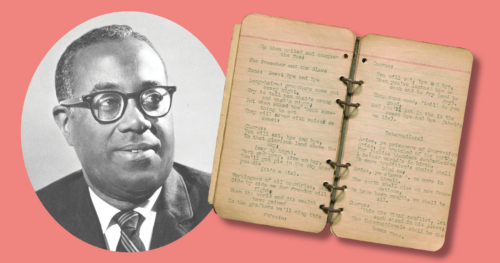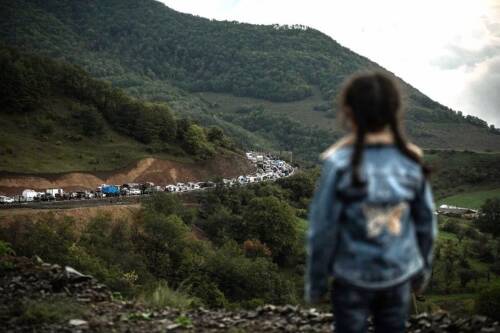Members of Puerto Rico’s Vieques Women’s Alliance make their case for continued Presbyterian partnerships
April 30, 2024

Members of the Vieques Women’s Alliance were featured during
Wednesday’s edition of “Connecting the Dots.” (Contributed photo)
A recent installment of the “Connecting the Dots” webinar series gave voice to three women who live on Vieques Island in the southeastern region of the Puerto Rico archipelago, an island that has faced many challenges including decades of hosting a U.S. Navy base for live-fire bombing practices.
Since Hurricane Maria in 2017, Vieques has had no hospital and offers its 9,000 or so residents only a community clinic with a dialysis treatment center. Further complicating matters, the company that provides ferry service from Vieques to Isla Grande — Puerto Rico’s Big Island — has recently filed for bankruptcy.
Michelle Muñiz, Presbyterian Disaster Assistance’s disaster recovery coordinator, hosted the webinar, which featured three members of the Vieques Women’s Alliance:
- Zaida I. Torres Rodriguez, a registered nurse and longtime member of the alliance.
- Miriam Ana Sobá Peterson, who was born and raised in Vieques and is a founding member of the Vieques Women’s Alliance.
- Ilandra O. Guadalupe Maldonado, an athlete, dancer and explorer of rivers who’s currently studying environmental health in pursuit of a public health degree.
The webinar was conducted in Spanish and included nearly simultaneous English translation.
“We were tired, fed up and angry,” Sobá Peterson said of the founding of the Vieques Women’s Alliance in 1999. “All of us women needed to turn out and give voice to what we were feeling and experiencing. We did not want these kinds of tragedies to keep on happening.”
The alliance “has given me tools to create my own narrative and exercise my right to remain on this land, and it’s expanded my knowledge about who came before me,” Guadalupe Maldonado said.
“I believe it’s extremely important to pass the baton to new generations,” said Torres Rodriguez, who’s 69 and is a cancer patient. “Military practices affected us for 60 years and left a legacy of pollution and contamination. The population of Vieques continues to face this challenge today.”
Without the ferry service, “it is extremely difficult to go to the main island and get services,” she said. “We honestly feel trapped in our community.”
Torres Rodriguez said members of the alliance and others are in dialogue with the United States government after filing a lawsuit. “We are trying to solicit an apology for everything that has happened with the U.S. naval base,” she said. Vieques has faced a population drain, and people from outside Puerto Rico are beginning to buy up available properties on the island. “There is a lot of short-term thinking,” Torres Rodriguez said. “Younger generations know what’s happening, and they need to be joining us in this fight to solve these problems so we can take back our land.”
Guadalupe Maldonado said she’s learned through her studies that the harmful effects of toxins that have accumulated in the bodies of Vieques residents “may not be seen immediately. We may not have symptoms now, but we will in the future.” She was born in 1998 and the Navy stopped its bombing exercises on Vieques five years later. As someone studying to become a health-care professional, “I see how this continues to affect us, so we need to create systems that help us,” Guadalupe Maldonado said. “If the government isn’t helping, it will be the responsibility of the Vieques Women’s Alliance to look out for our best interests.”
“We don’t want to leave Vieques,” Guadalupe Maldonado said. “We understand the environmental conditions we have been exposed to, but it’s our right to stay in our territory, and we want answers.”
Muñiz asked what people can do to support the Vieques Women’s Alliance and the community.
“We have been living this and we need to share our experiences. Each one of you can also do this,” Sobá Peterson said. “We want you to be our voice, our eyes. We want you to think of yourself as someone from Vieques. We honestly need a hospital. We need to continue to be resilient and continue fighting.”
Watch previous editions of “Connecting the Dots” here.
Mike Ferguson, Editor, Presbyterian News Service
Today’s Focus: ‘Connecting the Dots’ webinar
Let us join in prayer for:
PC(USA) Agencies’ Staff
Joanna Graf, Finance Administrator, Board of Pensions
Denise Gray, Accountant, General Ledger Office, Administrative Services Group (A Corp)
Let us pray
Lord of the harvest, may each of us grow in the place you have called us, nourished and nourishing others as we seek to serve you. Amen.
 Along with paper records, PHS collects a wide variety of digital formats and records oral and video histories. Through AALC, PHS recorded interviews at the National Black Presbyterian Caucus conference and preserved the memorial service of
Along with paper records, PHS collects a wide variety of digital formats and records oral and video histories. Through AALC, PHS recorded interviews at the National Black Presbyterian Caucus conference and preserved the memorial service of 






 They left their homeland in fear of persecution and ethnic cleansing …
They left their homeland in fear of persecution and ethnic cleansing …






 reader, her nose stuck in a book — at recess, in the car, and late at night under the pillow.
reader, her nose stuck in a book — at recess, in the car, and late at night under the pillow. 
